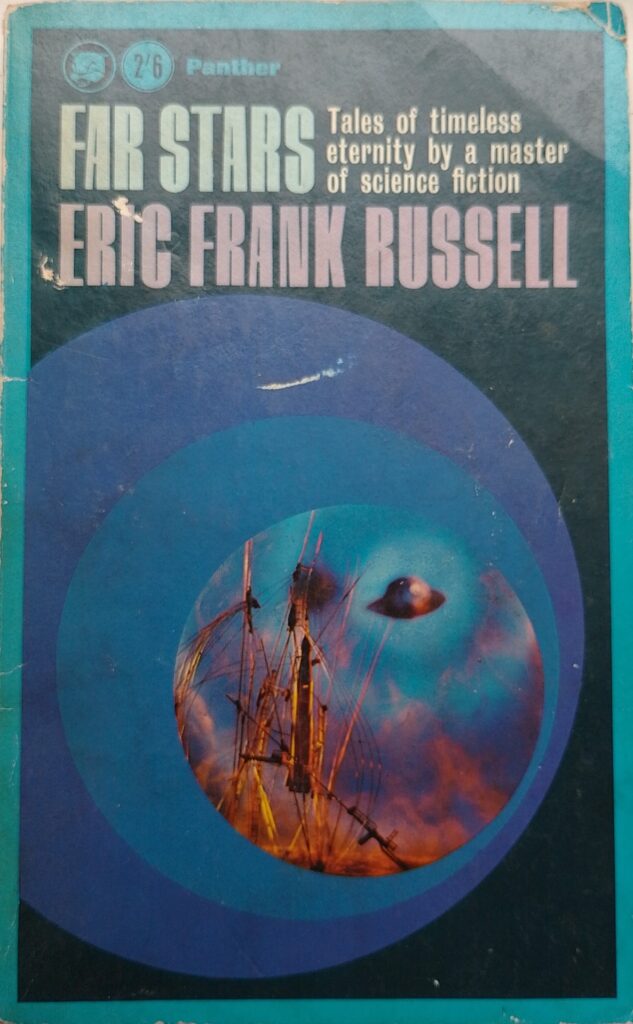First published 1961. Panther paperback, 1964, pp 128, c.62,000 words.
This is a collection of six stories, original published in magazines between 1952 and 1956. It includes one of the finest SF stories of the period, The Waitabits, that is also included in Edmund Crispin’s collection, Best S|F Six, reviewed elsewhere. Crispin, in his introduction to that story, notes that Russell frequently poked fun at authority figures and bureaucrats and most of these stories have at least an element of that, with the exception of P.S. which is also exceptional in that it is rather a poignant story, whereas all the others are lighter and frequently humorous. Russell is on the side of the little (human) guy.
The Waitabits is the pick of the collection, but all the others are quality stories and well worth reading. It concerns humanity’s expansion into the galaxy where it is colonising any worthwhile planets. There are rules: Intelligent aliens are to be treated decently, but so far humans have not encountered any that can’t be enticed to become a subject people because of the good life humans can offer in exchange for labour. Humans also have superior technology, so resistance is futile anyway. It is rather like the Romans advancing their empire. Until humans encounter The Waitabits that is. They are intelligent and have some sophisticated technology, although they are behind humans in not having made it to space. However in a startling piece of imagination, very well realised, they prove unconquerable.
P.S. is the story of a doctor who spent his life looking after a poor neighbourhood and has now retired. One day he encounters someone who grew up in his area, left sometime ago to go space fairing and is now on a brief visit back home. The encounter reveals some facts that the doctor might rather not have known.
Allamagoosa concerns the ripple spread of an over-zealous spacecraft inspection. It is only too plausible.
Legwork starts with an intelligent alien’s visit to planet Earth. His kind has so far come to dominate space, which humanity has not yet reached, and he is confident of equal success with Earth. The story then changes to the human’s point of view, and mostly concerns ground-level police procedure. This story suggests that low level functionaries have considerable value to society.
Diabologic is perhaps the weakest in terms of plot logic but is a highly amusing tale, and something of a mirror image of Legwork.
The last story, The Timeless Ones, again can be seen as a triumph of the little guy over the powers that be – in the long run.
Russell writes very well, with a clear and amusing style. He has some lovely laconic phrasing. For example, when the crew of a spaceship are suddenly recalled from recreation: ‘Someone pressed an alarm-stud and a resulting wave of adjectives spread half-way to the horizon’ [p55], and on the next page: ‘Once more the sirens stimulated enrichment of Earth-language’ [p56]. In another story he gives us: ‘Experience is a faithful and loving servant, always ready with a long, stimulating draft of ego when required’ [p61].
There is the usual inability to escape all the technology of the day the stories were written, however imaginative the author. Here we have electronic instrument read outs : ‘needle wagging or a florescent blip’ [p13] for example. Cameras are loaded with ‘magazines’ of limited capacity [p25].
This is a collection of delightful short stories, very capably written, and thought provoking.
Wikipedia biography of Russell: https://en.wikipedia.org/wiki/Eric_Frank_Russell
Others’ reviews of the book: https://www.goodreads.com/book/show/1875973.Far_Stars?from_search=true&from_srp=true&qid=FGig7az0Ki&rank=2
© William John Graham, November 2023

